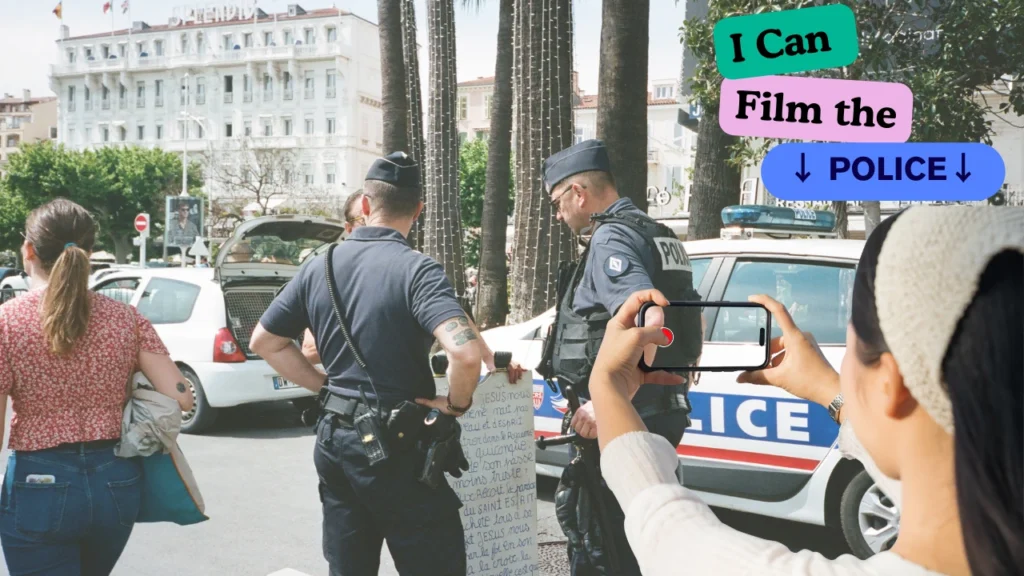Can You Film the Police in California? In an era where smartphones double as watchdogs, one persistent query emerges: Can you legally record police officers in California? And the answer, layered with nuance and legal boundaries, is yes but with important caveats.
Knowing your rights can safeguard you from unnecessary trouble while ensuring transparency in moments of public significance. California law permits individuals to document police activity as long as it occurs in a public space and does not obstruct official duties.
This right is rooted in the First Amendment, which champions free expression, and in California Penal Code §148(g), which specifically clarifies that recording is not interference unless it tangibly blocks officers from performing their roles.
Can You Film the Police in California? Your Legal Rights-Overview
| Article on | Can You Film the Police in California? Your Legal Rights |
| Right to Record | Allowed in public spaces as long as officers are performing official duties. |
| Location Matters | Recording in private property requires the owner’s consent. |
| Distance Requirement | Maintain safe space; don’t get close enough to interfere. |
| Seizing Your Phone | Police cannot delete or demand your footage without a warrant. |
| Audio Recording | Legal if the officer is in public and has no “reasonable expectation of privacy.” |
When Recording Crosses Into Interference
The dividing line between lawful documentation and unlawful obstruction can feel blurry. For clarity, imagine two scenarios:
- Lawful: Standing across the street while filming an officer conducting a traffic stop.
- Unlawful: Walking into the middle of the stop, speaking loudly, or blocking the officer’s line of sight.
The distinction lies in whether your actions impede law enforcement. California courts generally lean toward protecting your recording rights, but reckless behavior can swiftly dismantle that shield.

Can Police Take Your Phone?
A common myth suggests officers can demand you stop recording or hand over your phone. That’s incorrect as the law states the following:
- Confiscation requires a warrant.
- Deletion of footage is illegal.
- Coercion to stop recording violates constitutional rights.
Audio Recording Nuances
California is a two-party consent state when it comes to recording private conversations. Yet this does not typically extend to police officers performing public duties in open spaces. Since officers lack a “reasonable expectation of privacy” during official acts, you are generally safe to record audio of such interactions.
Responsibilities While Exercising Your Right
Rights and responsibilities exist in tandem. If you are filming, here are some duties to uphold:
- Respect Distance: Don’t obstruct.
- Avoid Provocation: Stay silent if possible; your camera is witness enough.
- Know Exit Strategies: If officers give lawful dispersal orders, comply while continuing to record safely.
- Protect Your Files: Use cloud storage or live-streaming to preserve evidence in case of deletion attempts.
Comparing Permissions and Prohibitions
This table makes it simpler to contrast what you can and cannot do while recording. The
Permissions vs. Prohibitions are as given below with the help of table:
| You Can | You Cannot |
| Record officers in public performing duties | Block officers or step into crime scenes |
| Record audio in public spaces | Secretly record private conversations |
| Save, share, or publish your videos | Tamper with evidence or edit misleadingly |
| Refuse unlawful phone seizure | Resist lawful search warrants |
Why Recording Matters
Filming the police is not merely an act of curiosity as it has evolved into a form of civic guardianship. Videos have exposed misconduct, cleared innocent individuals, and fueled reform debates. At the same time, recordings have also vindicated officers wrongly accused.
Final Thoughts
In California, filming the police is a protected right but not a limitless one. The key lies in balance: capture accountability without obstructing justice. Equip yourself with knowledge, keep composure in tense moments, and remember that your recordings can serve as both a shield and a spotlight in the pursuit of truth.
FAQs for Can You Film the Police in California?
Can I record police inside my car during a stop?
Yes, as long as you don’t interfere with the officer’s tasks.
Do officers have to tell me to stop recording?
No. If they believe you’re interfering, they can act without a warning.
What if an officer demands my phone?
Calmly state: “I don’t consent to a search.” They need a warrant.
Can the police arrest me for filming?
Not for filming itself, but they can if you obstruct or break another law.
Is livestreaming safer than local recording?
Often yes, because it prevents footage loss if your phone is seized.
